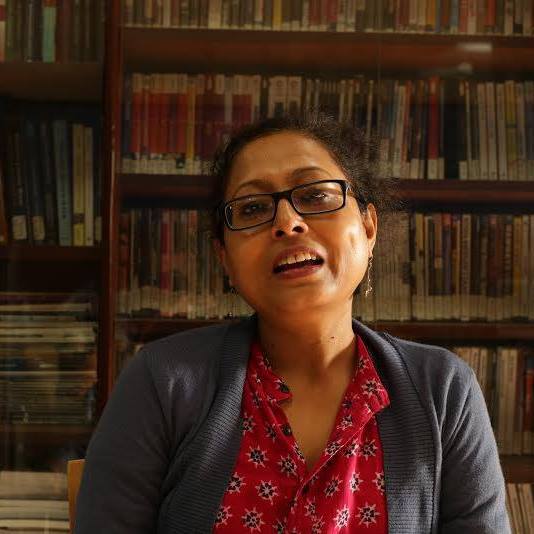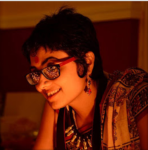INTERVIEW BY BISHNUPRIYA CHOWDHURI
Rongili Biswas is a bilingual writer and musician based in Kolkata, India. She has published a novel and a collection of short stories and has edited three books. She has also published fiction, creative non-fiction, memoirs, travelogues, poems, features, and reviews in journals, literary magazines and periodicals including The Telegraph, Plum Tree Tavern, Danse Macabre, Setu, Ariel Chart, Down in the Dirt, Café Dissensus, Riot, thespace.ink, Mad in India (Tendance Floue Editions), Humanities Underground, Yawp Journal, RIC Journal, and Wion.
Rongili has recently finished writing a novel on nineteenth-century French literature and Gustave Flaubert. She is the winner of two literary awards. Her novel ‘Jahangir, who had disappeared from custody’ has won the ‘Bangla Academy Award’ (2015) and one of her stories, ‘The Ballad of the Palm Trees’ has won the ‘Katha Award’ (2005). She was also one of the finalists at the Iceland Writers’ Retreat, 2023 Award and was an awardee of the Can Serrat Writers’ Residency, Spain in 2017. An economist by profession, Rongili has published widely in development, political and public economics.
As a writer working extensively in two languages, how do you perceive the idea of mother-tongue?
Thank you. This is far from being an easy question, though.
Well, if you ask me, whether Bangla (my mother tongue) is the language in which I had first expressed myself, the answer would be, yes. But if the question now becomes: is this the only language I grew up with? The answer would obviously be, no. Every language is an inheritance. I had two. Nay, three. I was fluent in Assamese in my childhood. At least, I could read the language very well. For, my father spoke, read and wrote it fluently and many of his colleagues gave me books and periodicals either written or translated in Assamese.
Although there was some pressure in school to do the home exercises in English, my mother made sure we read Bangla texts, especially classics. She would also read out to us entire chunks from various novels — translated or original– whenever she could manage time. Mark Twain was her absolute favourite. There were others, of course. That I learned almost the entirety of The Adventures of Tom Sawyer, Adventures of Huckleberry Finn, One thousand and One nights or How the Steel was Tempered by heart at a young age was because of her insistent reading sessions. Same was true for Rajsekhar Basu, Bibhutibhushan, Rabindranath and Sarat Chandra.
I have given you this background to suggest something else: for all practical purposes, Bangla – written or spoken – has always been our language. But texts in other languages abounded in our house– English, Assamese, Chinese (my father knew substantial Chinese as well), as well as all manners of translation. Since those early days of childhood, therefore, it was hard for me to perceive a single language as my sole medium of expression.
I always thought my mother tongue was a constant around which I would have to weave the varying musical notes of different languages. To some extent, I was able to do that in case of a couple of other European languages in my later life, but for obvious reasons, English became the predominant one.
In connection to my previous question, I am curious to learn about your writing journey—which language you picked up first for creative expression and how did you find the other language?
My first story (in Bangla, titled Mahima Bewa) was published in 1996. Before that, I worked in the genre of short fiction for nearly sixteen years, and never thought of publishing anything. I was, to borrow your expression, writing purely for creative expression, and being an overly fastidious person, was perennially dissatisfied with what I wrote.
But at some point, after I finished writing the story of a young (sericulturist) widow in a remote region of my state, it did not seem quite right that I delayed publishing forever. I felt that my friends, relatives, colleagues, and even unknown people, in short, my readers had a right to know about these lives – so very different from their own, and so very precious. That was when I went ahead with the publication of Mahima Bewa. Since then, many of my works in the genres of novels/shorter fiction/other prose were written and published in Bangla (although I never published even half of what I wrote).
Meanwhile, something happened. Back in 2005, I received a post-doctoral fellowship at the University of Caen, Normandie. I did not apply to a single country, let alone to a particular region. So, when it became evident that a university in lower Normandie was going to be my residence for the next few months, I felt that a series of accidental encounters would have a serious bearing on my life. For, it was not only about going to the country where Gustave Flaubert lived but about ending up in his specific region as well. Although his places were a little further up in upper Normandie, I would, after all, not live far from them. From there, germinated the idea of a novel that I recently completed (partly based on Flaubert’s life). This work appeared in my mind in the bodily form of a language, so to speak, and that was English. Given its setting, characters and locale, I felt I could not have written it in any other language.
Throughout these seventeen years of researching and writing the novel, I wrote many shorter narratives alongside – creative non-fiction, short and flash fiction, memory narratives, prose poems in both English and Bangla and published quite a few. So, barring a few exceptions, the subject and the context make me choose the language of writing. Yes, I can say that.
Also, what part do languages play in your selection of subjects which often tends to capture the marginal spaces and faces…
Thank you for asking this. As I said before, for me, themes often appear in the bodily form of a particular language. I have tried to draw upon my travel (and living) experiences in various regions of my state for many of my Bangla writings. When you talk about marginal spaces, probably those are the ones you are referring to. And it is true that I could not think of writing them in any other language.
But some of my English writings also dwell upon marginal spaces in the city. This is especially true about many of my memory narratives. I spent my childhood in one such locality. I do not think I had much of a trouble to recreate such a space in English. The flash pieces “The Size of Sorrow” and “In Praise of an Ornate Vase” are both based there.
Do you have a Muse (s)?
Well, yes, I guess. Quite a few. Among them, strange as it may sound, the first name that comes to my mind is William Faulkner. He is not only a guiding light, but a muse for me. The muse, if you prefer it that way.
What do you think of translating your own work? Would you do it yourself or prefer another person to take it up?
I am no translator. I had to do some translations for a couple of projects, but that was because I did not get anyone else to do it within a short span. Given a choice, I would not translate my own work. I would definitely love to work in close collaboration with translators, though.
You have worked in multiple genres, do you have a favorite? In your world, do languages play a role in deciding the form of writing?
My favourite is the novel/novella form. I also love writing in the flash fiction genre. Prose poem is another form that is becoming my favourite now – in both languages although I have published very few of them.
As far as the second part of your question is concerned, the answer is mostly no. For me, languages have nothing to do with the form of writing except for one: I am more comfortable writing memory-narratives in English. Because most of them are drawn from deep personal experiences, I fear, it will be hard for me to handle the process of writing in my mother tongue.
What are you currently reading/ writing?
I am currently writing a long series of intertwined memory narratives, flashes and creative non-fiction and also preparing the outline of two novels in English. I am also trying to finish a few short (and not so short) stories in Bangla for a collection slated to appear early next year.
I am (re)reading Roland Barthes’s Mourning Diary (a constant for the past six months), Italo Calvino’s The Road to San Giovanni, and Anna Burns’s No Bones by turns. In Bangla, I am trying to (re) read much of Sayeed Mustafa Siraj at this moment.
Some of Rongili’s writings can be found at:
- Novel excerpt: The Chartreuse Grass, Danse Macabre, November 1, 2022. https://dansemacabreonline.wixsite.com/neudm/rongili-biswas-146
- Short fiction: Tea Leaves Crushing, Ariel Chart International Literary Journal, October 5, 2022, https://www.arielchart.com/2022/10/tea-leaves-crushing.html
- Prose-poem: The Love Bugs, Plum Tree Tavern, September 11, 2022, https://theplumtreetavern.blogspot.com/
- Short Fiction: My Playmate’s House, Down in the Dirt Magazine (Scars Publications), August 22, 2022, http://scars.tv/2022May-August-issue-collection-book/The_Final_Frontier.htm
- Creative Non-fiction: ‘Dreaming about Stendhal: Ashes of Roses, The Tale of a Disappearing Grave, and the Charterhouse of Parma’, Setu, May 2022, https://www.setumag.com/2022/05/ashes-of-roses-tale-of-disappearing.html
- Impressions: ‘The Dream of a Leaf and Others’, RIC Journal, https://ricjournal.com/2021/03/19/the-dream-of-a-leaf-and-others/ 19 March, 2021.
- Impressions: ‘The Riverbend at Eventide’ and ‘The woman gestured to a Cat’, the space.ink,https://thespace.ink/literature-and-fiction/fiction-poetry/impressions/23 July, 2021.
- Article: ‘In Quest of Flaubert: Palimpsest as a Narrative Mode’, published in Jadavpur Journal of comparative Literature, 53, 2016-2017.
- Short fiction: ‘L’ombre Ancienne’, published in Mad in India, Tendance Floue Editions, France, 2008.
- Collection of shorter fiction in Bengali, ‘Ganashunanir Pore’(After the public hearing), Dey’s Publishing House, Kolkata, India, September, 2016. https://www.boibazar.com/book/gonoshunanir-pore
- First major publication (novel, Bengali): Hepajote Nikhoj Jahangir ( Jahangir, who disappeared from custody), Dey’s Publishing House, Kolkata, India, January, 2005. https://www.anandabazar.com/west-bengal/kolkata/kolkata-s-korcha-1.471285
- Book reviews in English and Bengali – The Telegraph, Anandabazar, Ei Samay, Aajkaal and other newspapers. Sample : ‘Brahmaputra: A life beyond its waters’ https://www.telegraphindia.com/culture/books/brahmaputra-a-life-beyond-its-waters/cid/1774776, The Telegraph, 21.05.2020
- Feature Article : ‘A day in Barkhola: Memory, history and the fading everyday in India’s Northeast’ https://cafedissensus.com/2020/03/21/a-day-in-barkhola-memory-history-and-the-fading-everyday-in-indias-northeast/, Café Dissensus, March 21, 2020
- Translated and edited: ‘Three poems and a letter by Hemango Biswas’, http://www.raiot.in/hemango-biswas-poems-shillong/, Raiot, December, 2019
- Feature article: ‘My father’s underground days in Shillong’, http://www.raiot.in/my-fathers-underground-days-in-shillong/ , Raiot, October, 2017
- Feature Article : ‘Singing the Boatman: Hemango Biswas and the ‘‘bahirana’’ in folk music’ http://humanitiesunderground.org/singing-the-boatman-hemango-biswas-and-the-bahirana-in-folk-music/ , Humanities Underground, November 10, 2015
Also, read Two Flash Fiction Pieces by Rongili Biswas, published in The Antonym:
Follow The Antonym’s Facebook page and Instagram account for more content and exciting updates.



























0 Comments